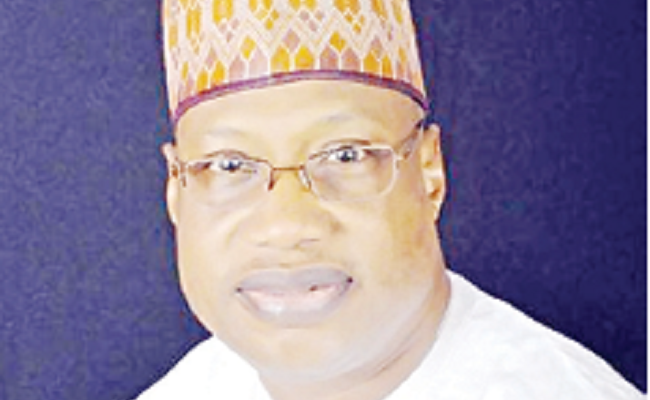
Mr Farouk Ahmed Umar is the Managing Director and Chief Executive Officer of the Nigerian Airspace Management Agency (NAMA). In this interview with SHOLA ADEKOLA during the League of Airports and Aviation Correspondents Annual Conference 2024, he speaks on industry trending issues ranging from the roles of the agency, its economic strategies and fee charges as a service provider, among other issues.
How will you describe the current economic landscape?

The aviation industry supports over $3.5 trillion or 4.1 percent of the world’s GDP. It supports about 87.7 million jobs the world over. In Africa, aviation supported 7.7 million jobs and $63 million in economic activities in the pre-COVID period. Nigeria has about 241,000 supported jobs contributing $1.7 billion to the economy.
The Nigeria’s figures are nowhere comparable to say South Africa with 472,000 supported jobs and $9.4 billion contribution to the economy or Kenya with 410,000 supported jobs and $3.2 billion GDP contribution.
Our industry has always been a barometer for the global economy and recent times have tested our resilience in unprecedented ways. The COVID-19 pandemic brought unparalleled disruptions, grounding flights and emptying airspaces and airports worldwide. Though recovery is underway, the path is uneven and fraught with challenges.
In Nigeria, the situation is further compounded by economic volatility, unprecedented hike in fuel prices and currency instability. These factors, combined with high operating costs, have put significant pressure on our aviation sector. As we navigate these turbulent times, it is imperative that we adopt innovative and sustainable strategies to ensure the survivability and growth of our industry.
What necessitated the recent hike in the fees and charges by NAMA?
The Nigerian Airspace Management Agency relies on statutory fees and charges for the management of the airspace. Remember that aviation takes place only in the air. These funds are generated from services we provide to the flying community. Without these fund, NAMA can’t discharge its responsibility of ensuring the safety of our airspace effectively. We majorly generate these funds through the airline companies.
The largest percentage of NAMA’s revenue comes from en-route navigation charges (domestic and international flights) and terminal navigation charges (domestic and international flights).While international flights pay in US dollar, domestic flights pay in the Nigerian currency.
As a service provider and in accordance with International Civil Aviation Organisation (ICAO) best practices, NAMA does not make profit. ICAO Doc 9082 recommends cost recovery for service provision to cater for the cost of equipment, personnel, trainings and other ancillary costs. This is what NAMA tries to do.
For 2023, NAMA has an expenditure of about N21 billion in personnel costs alone. It spent over N12 billion in capital costs and over N10 billion in overhead costs. All these were to be (and were) funded from fees and charges, no Federal Government of Nigeria budgetary allocation.
NAMA has been charging as low N11,000 per flight when a one-way domestic ticket cost only N16,000. While ticket prices today have gone up astronomically to as high as between N150,000 to N200,000 for a one way economy ticket owing to the prevailing economic circumstances, NAMA’s navigational charges have remained the same since June 2008.
Also, NAMA charges N50,000 for every hour that it has to extend services beyond the stipulated hours of service at aerodromes that do not have 24 hours service. In 2008 a litre of diesel was sold at around N113, today, it is well over N1,400 per litre, which represents over 1,000 percent increase which makes the current charges unsustainable. Same goes with personnel costs and other costs.
Currently, our unit rate for international flights charge for service provision is about $70; domestic flights are charged N6,000. While, NAMA recognises the difficult economic environment aviation operates in Nigeria, it is equally a part of the ecosystem. It goes to the same market to procure equipment and other services like trainings. If NAMA is to survive and continue to guarantee safety and efficiency in the airspace, it must breathe.
It is in the light of this and in the spirit of this conference’s theme of survivability that NAMA announces the review of its fees and charges. Even though most costs in the economy have increased by more than 1,000 percent, NAMA has proposed to increase its fees and charges by 800 percent.
The new unit rate/minimum charge for en-route is N18,000 from N2,000 per flight while the new unit rate/minimum charge for terminal navigation charge (TCN domestic) is N54,000 from N6,000 per flight with effect from September 1, 2024.
Also, the extension of hours of service is also to be reviewed from N50,000 to N450,000 per extension to enable the agency recover the cost of diesel and other logistics during the period of extension.
What is the agency doing in terms of trainings and empowerment?
NAMA has invested heavily in training programmes to equip our personnel with the latest skills and knowledge. Our training initiatives have ensured that our workforce remains proficient and adaptable to technological advancements.
We have strengthened our relationships with airlines, regulatory bodies and international partners. Collaborative efforts have led to improved air traffic management and better service delivery.
Recently, an investigative journalist erroneously reported that our primary radars have not been operational since 2021. Such misinformation has the potential to undermine public confidence in our aviation infrastructure. However, thanks to the vigilance, diligence and dedication of LAAC members, the core aviation reporters who stand for truth and integrity, this misinformation was swiftly debunked.
I want to take this opportunity to inform everyone that our radars are fully functional, though I must admit the system is due for an upgrade. NAMA has continuously invested in the latest technologies to ensure the safety and efficiency of our airspace. Our commitment to deploying advance systems guarantees that our skies remain safe for all.
I must also extend my heartfelt gratitude to my boss, the Minister of Aviation and Aerospace Development, Festus Keyamo, for his unwavering support. The success of NAMA is, in no small measure, attributed to his visionary leadership and steadfast commitment to the aviation sector. Under his guidance, we have achieved remarkable milestones. Let me be clear, the minister has never interfered in the operations of the Nigerian airspace management agency, which is a complete deviation from what was obtainable in other climes.
The road ahead is undoubtedly challenging, but it is not insurmountable. The Nigerian aviation sector has a rich history of resilience and innovation. By embracing change, fostering collaboration and maintaining our commitment to excellence, we can not only survive but thrive amidst this challenging macroeconomic environment.
What strategies are you adopting for survival and growth?
To survive in this challenging environment, we must prioritise operational efficiency and cost management. This involves streamlining our processes, optimising resource allocation and embracing technologies that enhance efficiency. The aviation industry requires collaborative approach to operational efficiency and cost management.
At the Nigerian Airspace Management Agency (NAMA), we are committed to continuously improving our air traffic management systems to ensure safe, efficient and cost-effective operations.
How is the agency embracing Innovation and Technology:
Innovative and technological approach is key to improving the survivability of our industry. They are the cornerstone of our survival. The digital transformation of aviation is not just a trend but a necessity. Implementing advanced technologies, leveraging Artificial Intelligence for predictive maintenance and enhancing cybersecurity measures are critical steps.
By embracing these technologies, we can improve safety, reduce delays and enhance the overall economic performance of Nigeria’s aviation. At NAMA, we are implementing advanced surveillance systems, communication and navigation systems that will enhance cost effective flight procedures.
Are there plans to strengthen airspace infrastructure?
Robust and modern infrastructure is essential for the growth of our aviation sector. Our airports need more modern infrastructure to accommodate the present and future demands of airport terminals that support more efficient flight operations. NAMA is dedicated to upgrading our airspace infrastructure to accommodate future demands. This includes modernising navigational aids, enhancing radar coverage and implementing satellite-based systems. These upgrades will improve safety, efficiency and capacity, positioning Nigeria as a key player in global aviation.
What are you doing to foster collaboration and partnerships?
The challenges we face are too great for any single entity to tackle alone. Collaboration is key. We must foster partnerships amongst airlines, air navigation service providers, airports, regulatory bodies and other stakeholders. By working together, we can share best practices, pool resources and develop strategies that benefit the entire industry. International cooperation is also vital, as global connectivity is the backbone of our aviation.
What about efficient pricing?
Our industry requires a very efficient pricing of products and services. It is a critical leverage for enhancing affordability, driving competition, supporting infrastructural development, promoting sustainability and improving operational efficiency. Price for services must reflect the value of these services.
What is the role of NAMA in supporting the growth of Nigeria’s aviation sector?
As you are aware, at NAMA, our mission is to provide safe, efficient and cost-effective air navigation services. We are committed to supporting the growth of Nigeria’s aviation sector by enhancing our capabilities and adapting to the evolving needs of the industry. Our focus remains on safety, innovation and sustainability as we navigate these challenging times.
Read Also: Court restricts hunger protest in FCT








